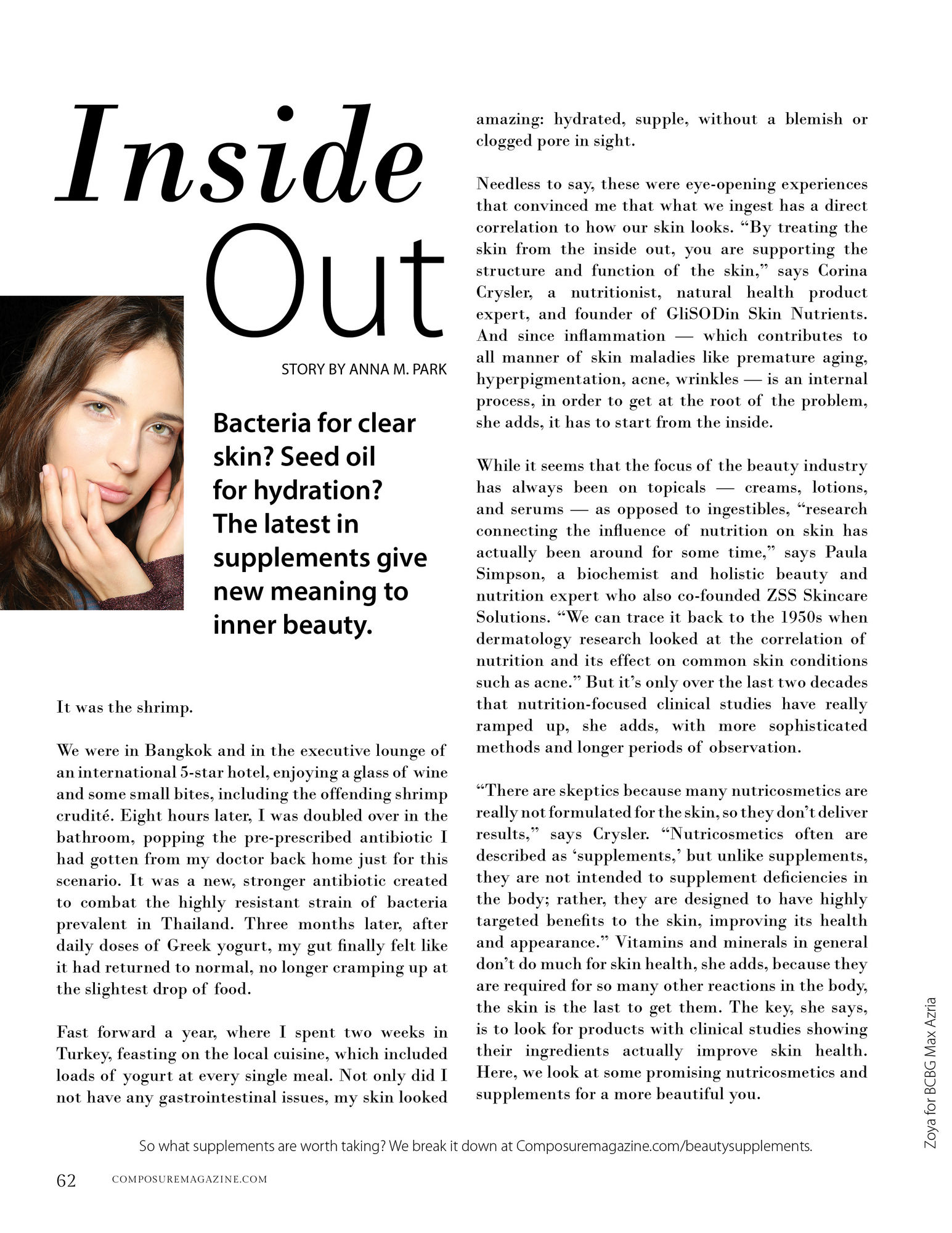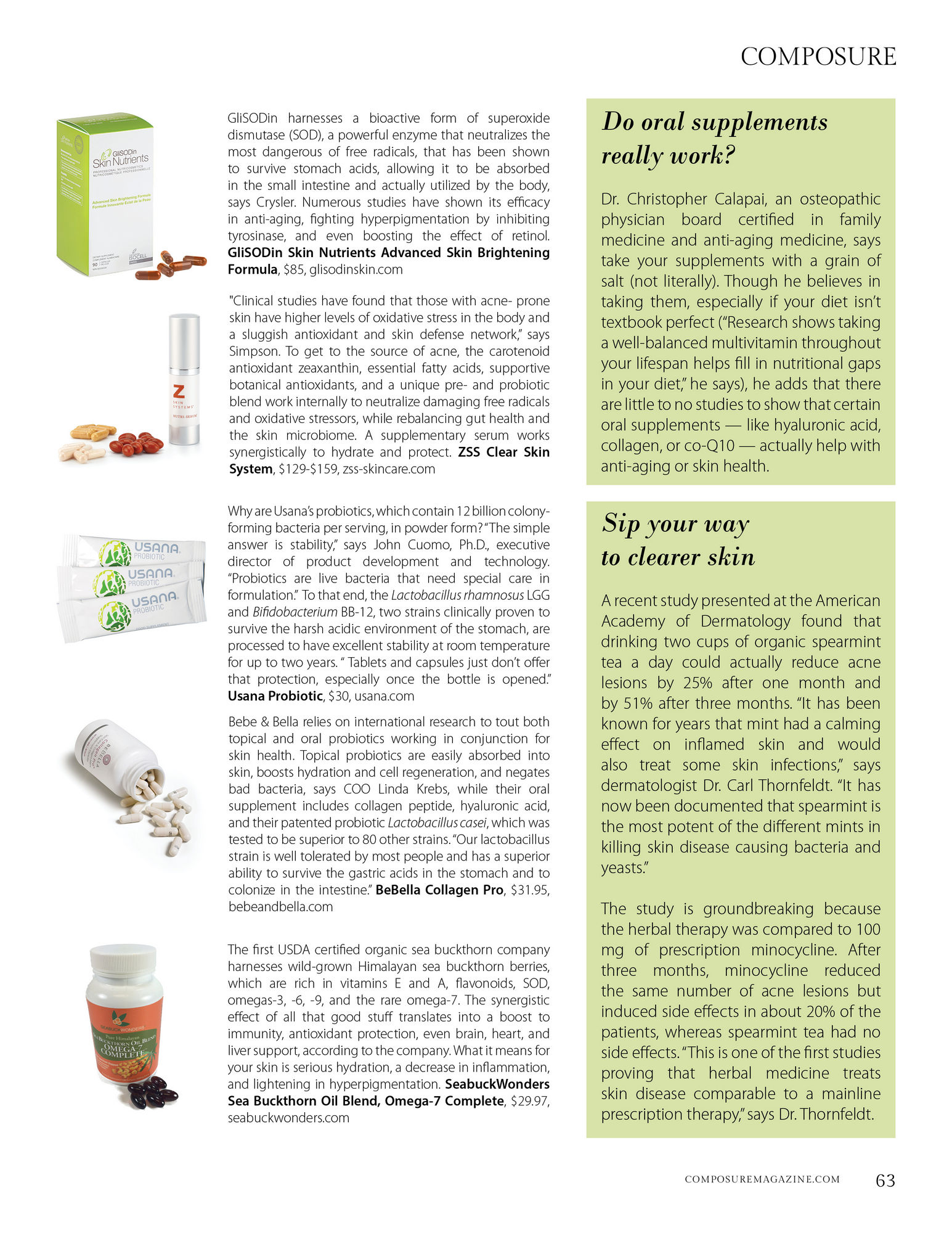
 Bacteria for clear skin? Seed oil for hydration? The latest in supplements give new meaning to inner beauty.
Bacteria for clear skin? Seed oil for hydration? The latest in supplements give new meaning to inner beauty.
STORY BY ANNA M. PARK
It was the shrimp.
We were in Bangkok and in the executive lounge of an international 5-star hotel, enjoying a glass of wine and some small bites, including the offending shrimp crudité. Eight hours later, I was doubled over in the bathroom, popping the pre-prescribed antibiotic I had gotten from my doctor back home just for this scenario. It was a new, stronger antibiotic created to combat the highly resistant strain of bacteria prevalent in Thailand. Three months later, after daily doses of Greek yogurt, my gut finally felt like it had returned to normal, no longer cramping up at the slightest drop of food.
Fast forward a year, where I spent two weeks in Turkey, feasting on the local cuisine, which included loads of yogurt at every single meal. Not only did I not have any gastrointestinal issues, my skin looked amazing: hydrated, supple, without a blemish or clogged pore in sight.
Needless to say, these were eye-opening experiences that convinced me that what we ingest has a direct correlation to how our skin looks. “By treating the skin from the inside out, you are supporting the structure and function of the skin,” says Corina Crysler, a nutritionist, natural health product expert, and founder of GliSODin Skin Nutrients. And since inflammation — which contributes to all manner of skin maladies like premature aging, hyperpigmentation, acne, wrinkles — is an internal process, in order to get at the root of the problem, she adds, it has to start from the inside.
While it seems that the focus of the beauty industry has always been on topicals — creams, lotions, and serums — as opposed to ingestibles, “research connecting the influence of nutrition on skin has actually been around for some time,” says Paula Simpson, a biochemist and holistic beauty and nutrition expert who also co-founded ZSS Skincare Solutions. “We can trace it back to the 1950s when dermatology research looked at the correlation of nutrition and its effect on common skin conditions such as acne.” But it’s only over the last two decades that nutrition-focused clinical studies have really ramped up, she adds, with more sophisticated methods and longer periods of observation.
“There are skeptics because many nutricosmetics are really not formulated for the skin, so they don’t deliver results,” says Crysler. “Nutricosmetics often are described as ‘supplements,’ but unlike supplements, they are not intended to supplement deficiencies in the body; rather, they are designed to have highly targeted benefits to the skin, improving its health and appearance.” Vitamins and minerals in general don’t do much for skin health, she adds, because they are required for so many other reactions in the body, the skin is the last to get them. The key, she says, is to look for products with clinical studies showing their ingredients actually improve skin health. Here, we look at some promising nutricosmetics and supplements for a more beautiful you.
- GliSODin harnesses a bioactive form of superoxide dismutase (SOD), a powerful enzyme that neutralizes the most dangerous of free radicals, that has been shown to survive stomach acids, allowing it to be absorbed in the small intestine and actually utilized by the body, says Crysler. Numerous studies have shown its efficacy in anti-aging, fighting hyperpigmentation by inhibiting tyrosinase, and even boosting the effect of retinol. GliSODin Skin Nutrients Advanced Skin Brightening Formula, $85, glisodinskin.com
- “Clinical studies have found that those with acne- prone skin have higher levels of oxidative stress in the body and a sluggish antioxidant and skin defense network,” says Simpson. To get to the source of acne, the carotenoid antioxidant zeaxanthin, essential fatty acids, supportive botanical antioxidants, and a unique pre- and probiotic blend work internally to neutralize damaging free radicals and oxidative stressors, while rebalancing gut health and the skin microbiome. A supplementary serum works synergistically to hydrate and protect. ZSS Clear Skin System, $129-$159, zss-skincare.com
- Why are Usana’s probiotics, which contain 12 billion colonyforming bacteria per serving, in powder form? “The simple answer is stability,” says John Cuomo, Ph.D., executive director of product development and technology. “Probiotics are live bacteria that need special care in formulation.” To that end, the Lactobacillus rhamnosus LGG and Bifidobacterium BB-12, two strains clinically proven to survive the harsh acidic environment of the stomach, are processed to have excellent stability at room temperature for up to two years. “ Tablets and capsules just don’t offer that protection, especially once the bottle is opened.” Usana Probiotic, $30, usana.com
- Bebe & Bella relies on international research to tout both topical and oral probiotics working in conjunction for skin health. Topical probiotics are easily absorbed into skin, boosts hydration and cell regeneration, and negates bad bacteria, says COO Linda Krebs, while their oral supplement includes collagen peptide, hyaluronic acid, and their patented probiotic Lactobacillus casei, which was tested to be superior to 80 other strains. “Our lactobacillus strain is well tolerated by most people and has a superior ability to survive the gastric acids in the stomach and to colonize in the intestine.” BeBella Collagen Pro, $31.95, bebeandbella.com
- The first USDA certified organic sea buckthorn company harnesses wild-grown Himalayan sea buckthorn berries, which are rich in vitamins E and A, flavonoids, SOD, omegas-3, -6, -9, and the rare omega-7. The synergistic effect of all that good stuff translates into a boost to immunity, antioxidant protection, even brain, heart, and liver support, according to the company. What it means for your skin is serious hydration, a decrease in inflammation, and lightening in hyperpigmentation. SeabuckWonders Sea Buckthorn Oil Blend, Omega-7 Complete, $29.97, seabuckwonders.com
Do oral supplements really work?
Dr. Christopher Calapai, an osteopathic physician board certified in family medicine and anti-aging medicine, says take your supplements with a grain of salt (not literally). Though he believes in taking them, especially if your diet isn’t textbook perfect (“Research shows taking a well-balanced multivitamin throughout your lifespan helps fill in nutritional gaps in your diet,” he says), he adds that there are little to no studies to show that certain oral supplements — like hyaluronic acid, collagen, or co-Q10 — actually help with anti-aging or skin health.
Sip your way to clearer skin
A recent study presented at the American Academy of Dermatology found that drinking two cups of organic spearmint tea a day could actually reduce acne lesions by 25% after one month and by 51% after three months. “It has been known for years that mint had a calming effect on inflamed skin and would also treat some skin infections,” says dermatologist Dr. Carl Thornfeldt. “It has now been documented that spearmint is the most potent of the different mints in killing skin disease causing bacteria and yeasts.”
The study is groundbreaking because the herbal therapy was compared to 100 mg of prescription minocycline. After three months, minocycline reduced the same number of acne lesions but induced side effects in about 20% of the patients, whereas spearmint tea had no side effects. “This is one of the first studies proving that herbal medicine treats skin disease comparable to a mainline prescription therapy,” says Dr. Thornfeldt.





